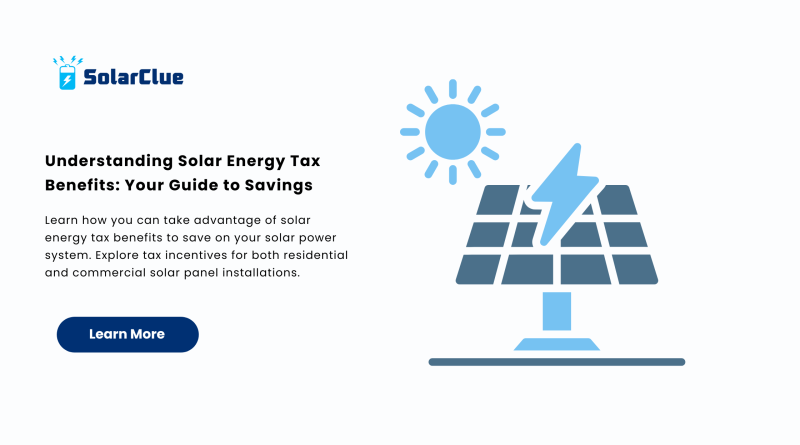Understanding Solar Energy Tax Benefits: Your Guide to Savings
As solar energy grows in popularity, many homeowners and businesses are looking for ways to make their investments more affordable. One of the biggest advantages of installing a solar power system is the tax incentives available. These benefits make transitioning to solar power easier and more cost-effective. In this post, we’ll explain the solar energy tax benefits and how you can take advantage of them.
Table of Contents
The Basics of Solar Energy Tax Benefits
When you install a solar panel system, you may qualify for tax credits and deductions. These incentives help lower the upfront cost of installation. Many governments offer these financial incentives to encourage the use of renewable energy and reduce reliance on fossil fuels.
The Federal Solar Investment Tax Credit (ITC)
The Federal Solar Investment Tax Credit (ITC) is one of the most valuable incentives. It applies to both residential and commercial solar installations. The ITC allows homeowners and businesses to claim a percentage of the total solar power system cost as a credit on their federal taxes.
How the ITC Works
The ITC offers a tax credit for 26% of the cost of your solar panel system. For example, if you spend $20,000 on a solar power installation, you can claim a $5,200 tax credit. This can reduce the amount of taxes you owe. The ITC is available for both residential and commercial properties.
Key Considerations
-
Eligibility: The solar power system must be installed on a property you own. The system should be used to generate electricity for that property.
-
System Size: There are no size restrictions on the solar power system. Whether it’s small or large, you can benefit from the ITC.
-
Installation Deadline: The ITC will decrease over time. It will drop to 22% in 2023 and to 0% for residential systems in 2024. Commercial systems may still qualify for 10%.
State and Local Solar Tax Incentives
Many states and local governments also offer solar energy tax benefits. These incentives can vary depending on where you live, so it’s essential to check what’s available in your area.
Property Tax Exemptions
Some states provide property tax exemptions. This means the value added by your solar power system won’t increase your property taxes. For instance, if your system raises your property’s value by $15,000, you won’t have to pay higher taxes on that amount.
Sales Tax Exemptions
Certain states offer sales tax exemptions for the purchase of solar panels. This means you won’t have to pay sales tax on your solar power system, further reducing your upfront costs.
The Solar Energy Tax Credit for Businesses
Businesses can also take advantage of solar energy tax benefits. The ITC applies to commercial solar installations as well. Businesses can also qualify for additional tax deductions:
-
Accelerated Depreciation under MACRS: Businesses can depreciate the cost of their solar power system over five years. This helps businesses save even more.
-
State-Specific Business Incentives: Some states offer specific incentives for businesses installing solar power systems, such as grants and rebates.
Why Solar Energy Tax Benefits Matter
Adopting solar energy offers more than just environmental benefits. The solar energy tax benefits can make the system more affordable and provide long-term savings. Here’s why these incentives are crucial:
-
Lower Initial Costs: The ITC and state incentives can significantly reduce the upfront cost of a solar power system.
-
Increased Property Value: Homes with solar panels tend to sell for more than those without. Property tax exemptions ensure the added value doesn’t raise your property taxes.
-
Long-Term Savings: With reduced electricity bills and the ability to sell excess energy, solar power systems offer savings that continue for decades.
How to Claim Solar Energy Tax Benefits
To claim these benefits, you’ll need to file specific forms with your taxes. Here’s a simple guide to help:
-
Complete IRS Form 5695: This form is used to claim the federal ITC. It asks for details about your solar power system, including the total cost and installation date.
-
Include the Cost of Installation: You can claim the installation costs in addition to the cost of the solar panels.
-
Claim the Credit: After completing the necessary forms, the ITC credit will be applied to your taxes, reducing the amount you owe or increasing your refund.
Frequently Asked Questions (FAQs)
1. Can I claim the ITC if I’m leasing my solar power system?
No, the ITC is only available for those who purchase the solar power system. If you’re leasing the system, you can’t claim the ITC, but the lessor may qualify.
2. Are there any additional tax benefits for businesses?
Yes, businesses can take advantage of the ITC as well as accelerated depreciation under MACRS. These additional incentives help businesses save even more on their solar power system installation.
3. How do I know if I’m eligible for state incentives?
State incentives vary by location. Check with your state’s energy department or local tax authority to learn more about available solar energy tax benefits in your area.
Installing a solar power system can significantly reduce your energy costs, and with the various solar energy tax benefits available, it’s a more affordable investment than ever. To learn more about solar energy, visit SolarClue for more information and explore our wide range of products and services.





